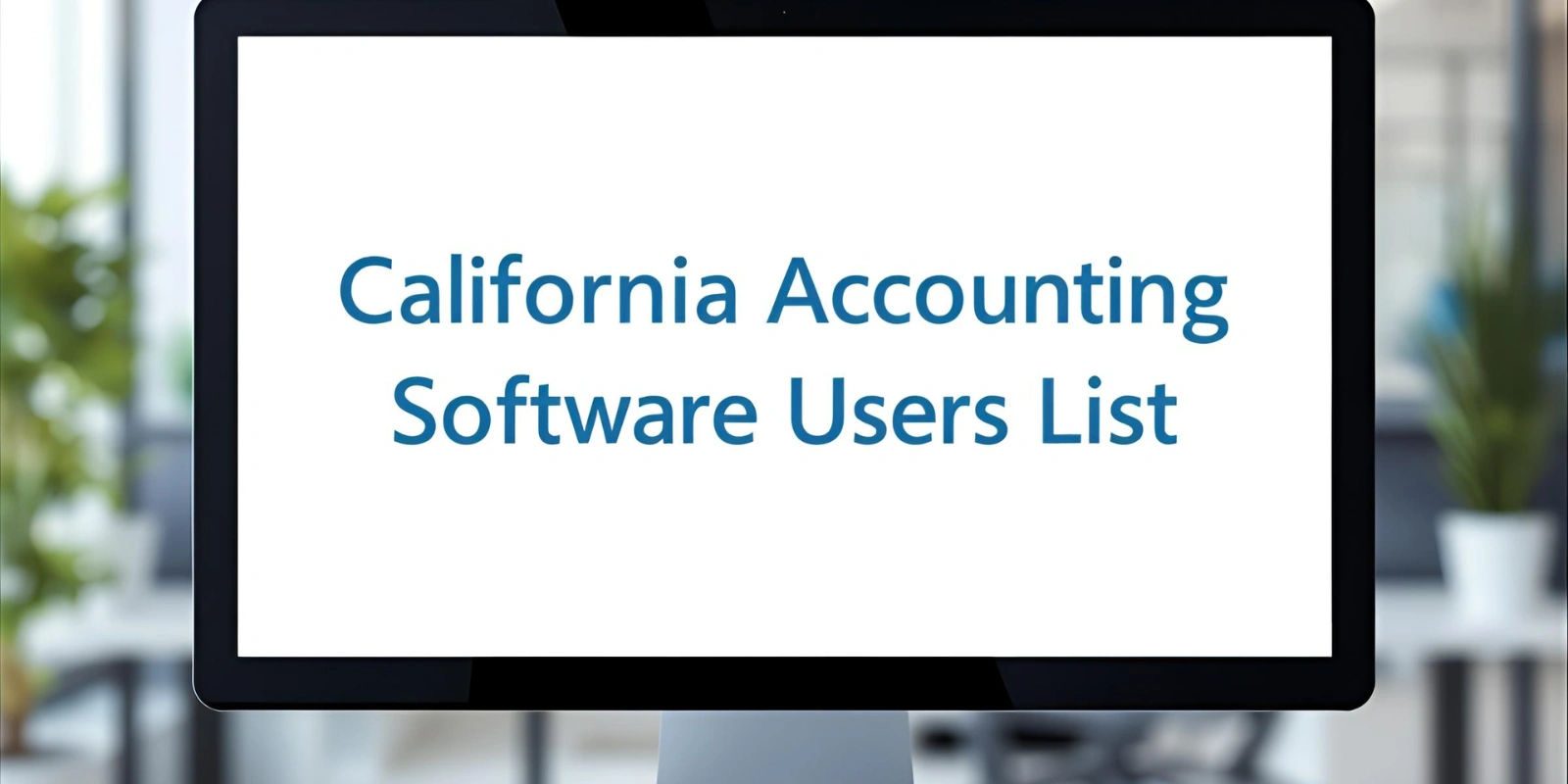How to Build a California Accounting Software Users List
California represents the largest market for accounting software users in the United States, with over 4 million businesses spanning diverse industries from technology startups in Silicon Valley to entertainment companies in Los Angeles and agricultural enterprises in the Central Valley. ResearchCaptive recognizes that building a targeted California accounting software users list requires understanding the unique business landscape, regulatory environment, and technological preferences that define the Golden State’s financial ecosystem. This comprehensive guide provides actionable strategies for identifying, sourcing, and organizing accounting software users across California’s major metropolitan areas and industry clusters.
Understanding California’s Accounting Software Landscape
California’s economy drives national trends in accounting software adoption, with businesses leading in cloud-based solutions, mobile accessibility, and integration capabilities. ResearchCaptive’s market research reveals distinct usage patterns across the state’s major regions:
Silicon Valley and Bay Area
Tech startups, venture-backed companies, and established technology firms in San Francisco, San Jose, and surrounding areas favor cloud-native solutions like NetSuite, Xero, and modern platforms that integrate with SaaS tools. These organizations prioritize scalability, real-time reporting, and multi-currency capabilities for global operations.
Los Angeles and Southern California
Entertainment companies, media agencies, and creative businesses in Los Angeles rely heavily on project-based accounting features found in platforms like FreshBooks, QuickBooks, and specialized industry solutions. The region’s diverse economy includes manufacturing, healthcare, and international trade businesses requiring robust compliance and reporting capabilities.
San Diego and Orange County
Biotech companies, medical device manufacturers, and professional services firms in these regions often use sophisticated accounting platforms like Intacct, NetSuite, or industry-specific solutions that support complex project accounting and regulatory compliance requirements.
Central Valley and Agricultural Regions
Agricultural businesses, food processing companies, and related industries throughout California’s Central Valley typically utilize accounting software with strong inventory management, seasonal reporting, and commodity tracking capabilities, often choosing platforms like Sage or specialized agricultural accounting solutions.
Sacramento and Government Sector
Government contractors, professional services firms, and businesses serving public sector clients in the Sacramento region require accounting software with robust compliance features, audit trails, and government reporting capabilities.
Industry-Specific Software Preferences in California
ResearchCaptive has identified clear patterns in accounting software selection across California’s key industries:
Technology and Software Companies
California’s tech sector predominantly uses cloud-based platforms that integrate seamlessly with development tools, customer relationship management systems, and business intelligence platforms. Popular choices include NetSuite for larger organizations, Xero for growing startups, and QuickBooks Online for smaller tech companies.
Entertainment and Media
Project-based accounting is essential for California’s entertainment industry, with companies selecting platforms that support job costing, talent payments, and complex revenue recognition. FreshBooks, QuickBooks Premier, and industry-specific solutions dominate this sector.
Healthcare and Biotech
Strict regulatory requirements drive healthcare organizations toward accounting platforms with strong compliance features, audit capabilities, and integration with electronic health records. Common choices include Intacct, NetSuite, and specialized healthcare accounting solutions.
Manufacturing and Distribution
California’s manufacturing sector requires accounting software with robust inventory management, supply chain integration, and multi-location capabilities. Popular platforms include Sage, NetSuite, and ERP-integrated accounting modules.
Professional Services
Law firms, consulting companies, and accounting firms throughout California prioritize time tracking, billing automation, and client portal features, often selecting QuickBooks, FreshBooks, or specialized professional services platforms.
Geographic Segmentation Strategies for California
Northern California Focus
Northern California’s business concentration in the Bay Area creates unique opportunities for targeted list building:
San Francisco proper houses fintech companies, consulting firms, and headquarters operations requiring sophisticated accounting platforms. ResearchCaptive targets these organizations through technology databases, LinkedIn searches focused on finance roles at Bay Area companies, and partnerships with local accounting firms.
Silicon Valley encompasses thousands of startups and established technology companies across cities like Palo Alto, Mountain View, and San Jose. List building strategies include monitoring venture funding announcements, tracking company growth stages, and identifying businesses transitioning from basic bookkeeping to enterprise accounting solutions.
Oakland and East Bay regions feature diverse businesses including logistics companies, manufacturing firms, and professional services organizations. These markets often represent cost-conscious buyers seeking robust features at competitive price points.
Central California Targeting
The Central Valley’s agricultural and manufacturing base requires specialized approaches:
Fresno and surrounding agricultural centers house farms, food processors, and agricultural services companies with seasonal accounting needs and inventory-intensive operations. ResearchCaptive builds lists by identifying businesses through agricultural associations, commodity boards, and industry publications.
Stockton and Modesto serve as distribution and logistics hubs requiring accounting software with multi-location capabilities and transportation industry features.
Southern California Market Development
Southern California’s diverse economy supports multiple list-building strategies:
Los Angeles metropolitan area encompasses entertainment companies, manufacturing firms, international trade businesses, and professional services organizations. ResearchCaptive segments by industry vertical while considering the region’s emphasis on creative project accounting and multi-entity operations.
Orange County represents a concentration of mid-market businesses, healthcare organizations, and technology companies requiring scalable accounting solutions that support rapid growth.
San Diego’s biotech cluster, military contractors, and tourism industry create demand for specialized accounting features including government compliance, research and development tracking, and hospitality-specific capabilities.
Data Sources and Research Methodologies
ResearchCaptive employs multiple data collection strategies tailored to California’s business environment:
Technology Databases and Directories
California’s technology focus enables list building through databases that track software adoption, venture funding, and technology stack information. Platforms like Builtwith, Datanyze, and Crunchbase provide insights into accounting software usage among California companies.
Professional Networks and Associations
California’s active professional community supports list building through:
- California Society of CPAs member directories and event attendee lists
- Local chambers of commerce across major metropolitan areas
- Industry-specific associations in key sectors like biotechnology, entertainment, and agriculture
- LinkedIn groups focused on California finance professionals
Business Registration and Public Records
California’s comprehensive business registration system provides data for identifying new companies, business expansions, and industry classifications that inform accounting software needs assessment.
Local Media and Business Publications
California’s robust business media landscape, including publications like the Los Angeles Business Journal, San Francisco Business Times, and Silicon Valley Business Journal, provides insights into company growth, technology adoption, and executive changes that indicate accounting software needs.
Compliance and Legal Considerations
California’s stringent privacy regulations, particularly the California Consumer Privacy Act (CCPA), require careful attention to data collection and usage practices:
CCPA Compliance Requirements
ResearchCaptive ensures all California list building activities comply with CCPA requirements by:
- Documenting the source and purpose of all collected personal information
- Providing clear opt-out mechanisms for all communications
- Maintaining detailed records of consent and data processing activities
- Implementing data minimization practices that collect only necessary information
Permission-Based Marketing
California’s business community expects high standards for email marketing practices. ResearchCaptive emphasizes:
- Double opt-in processes for newsletter subscriptions and content downloads
- Clear identification of commercial communications
- Professional, value-driven content that justifies inbox presence
- Regular list cleaning to remove inactive or unengaged contacts
Data Security and Protection
California businesses, particularly in regulated industries like healthcare and financial services, require vendors to demonstrate strong data security practices. ResearchCaptive implements enterprise-grade security measures and provides documentation of compliance standards.
Segmentation and Personalization Strategies
California’s diverse business landscape requires nuanced segmentation by company size:
- Startups and small businesses (1-20 employees) typically seek affordable, easy-to-implement solutions with strong mobile capabilities and integration with popular small business tools.
- Growing companies (21-100 employees) require scalable platforms that can accommodate rapid growth, multiple users, and increasing complexity in financial operations.
- Mid-market organizations (101-500 employees) need robust feature sets, advanced reporting capabilities, and integration with other business systems.
- Enterprise companies (500+ employees) require sophisticated platforms with multi-entity capabilities, advanced security features, and extensive customization options.
Industry Vertical Customization
Each of California’s major industries requires specialized messaging and content:
- Technology companies respond to content about scaling financial operations, managing burn rates, and preparing for funding rounds or public offerings.
- Entertainment businesses value information about project accounting, talent payments, and creative industry-specific compliance requirements.
- Healthcare organizations prioritize content about regulatory compliance, audit preparedness, and integration with healthcare management systems.
- Agricultural businesses seek information about seasonal reporting, commodity tracking, and agricultural industry-specific tax considerations.
Geographic Micro-Targeting
California’s regional diversity enables highly targeted campaigns:
- Bay Area campaigns emphasize innovation, scalability, and integration with cutting-edge technologies.
- Los Angeles area messaging focuses on creative project management, multi-entity operations, and entertainment industry expertise.
- San Diego content highlights compliance capabilities, research and development tracking, and biotech industry specialization.
- Central Valley communications address agricultural accounting needs, seasonal reporting, and rural business considerations.
Content Strategy and Messaging
Educational Content Development
- California businesses value educational content that helps them make informed decisions:
- Implementation guides specific to California regulatory requirements and business practices.
- Case studies featuring successful California companies and their accounting software selection processes.
- Compliance checklists addressing California-specific regulations and reporting requirements.
- Industry trend reports analyzing accounting software adoption patterns across California’s key sectors.
Local Success Stories and Testimonials
- California businesses trust recommendations from similar organizations within the state:
- Customer success stories from companies in the same industry and geographic region.
- Executive testimonials from respected California business leaders.
- Case studies demonstrating ROI and business outcomes achieved by California companies.
- Industry award recognition and third-party validation from California business publications.
Event Marketing and Community Engagement
- California’s active business community supports event-based list building and relationship development:
- Sponsorship and participation in California accounting conferences and trade shows.
- Local user group meetings and educational seminars in major metropolitan areas.
- Webinar series addressing California-specific business challenges and opportunities.
- Partnership with California accounting firms and business consultants for co-marketing opportunities.
CRM and Marketing Automation
Effective California list management requires sophisticated technology platforms:
- Customer relationship management systems that track company growth stages, software adoption timelines, and engagement history.
- Marketing automation platforms that deliver personalized content based on industry, location, and company size.
- Lead scoring models that prioritize prospects based on fit, engagement, and buying signals.
- Integration between sales and marketing systems to ensure seamless lead handoff and follow-up.
Data Enrichment and Validation
- California’s dynamic business environment requires ongoing data maintenance:
- Automated data enrichment to update company information, employee counts, and technology stack details.
- Regular validation of contact information and engagement preferences.
- Monitoring of business changes including acquisitions, relocations, and executive transitions.
- Integration with external data sources to track funding events, business expansions, and other buying signals.
Performance Measurement and Optimization
Key Performance Indicators
- ResearchCaptive tracks comprehensive metrics to evaluate list building effectiveness:
- List growth rates by geographic region and industry vertical.
- Engagement rates including email opens, clicks, and content downloads.
- Conversion rates from initial contact to qualified lead and eventual customer.
- Return on investment for different list building strategies and channels.
Continuous Improvement Processes
- Regular analysis and optimization ensure ongoing success:
- Quarterly reviews of list performance and engagement metrics.
- A/B testing of messaging, content formats, and outreach strategies.
- Feedback collection from sales teams about lead quality and conversion rates.
- Market research to identify emerging trends and opportunities in California’s business landscape.
Future Trends and Opportunities
Emerging Technologies
- California’s position as a technology leader creates opportunities for early adoption:
- Artificial intelligence and machine learning integration in accounting software selection and usage.
- Blockchain and cryptocurrency accounting requirements among California’s innovative companies.
- Mobile-first accounting solutions for California’s entrepreneurial and remote work culture.
- Integration with emerging business technologies including IoT, AR/VR, and advanced analytics platforms.
Regulatory Evolution
- California’s regulatory leadership often predicts national trends:
- Enhanced data privacy requirements that may influence software selection criteria.
- Environmental reporting requirements that could drive demand for sustainability-focused accounting features.
- Gig economy regulations affecting how California businesses track and report contractor payments.
Economic Development Initiatives
- California’s economic development programs create new opportunities:
- Small business support programs that may influence accounting software adoption.
- Industry-specific incentives that could drive growth in targeted sectors.
- Infrastructure investments that may create new business formation and accounting software needs.
Conclusion
Building a successful California accounting software users list requires understanding the state’s unique business environment, regulatory landscape, and technological preferences. ResearchCaptive’s systematic approach combines comprehensive market research, sophisticated segmentation strategies, and ongoing optimization to deliver high-quality prospects that convert into valuable business relationships.
Success in the California market depends on providing genuine value through educational content, maintaining strict compliance standards, and developing deep understanding of regional business needs. Organizations that invest in building authentic relationships with California’s business community while leveraging advanced technology and data analytics will achieve sustainable competitive advantages.
The implementation process should begin with market research and persona development, followed by systematic data collection and list building activities. Regular performance monitoring and optimization ensure continued effectiveness while compliance monitoring protects against regulatory risks.
California’s dynamic business environment creates ongoing opportunities for organizations that understand local needs, respect privacy requirements, and deliver consistent value through their communications and services. By following ResearchCaptive’s comprehensive approach, businesses can build valuable relationships with California’s accounting software user community while achieving their growth and revenue objectives.
ResearchCaptive recommends starting with a focused geographic area or industry vertical, testing messaging and content approaches, and gradually expanding based on proven success patterns. With careful planning, systematic execution, and ongoing optimization, a California accounting software users list becomes a powerful asset for sustainable business growth and market leadership.







